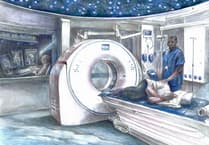ANAESTHETISTS at Torbay Hospital are leading the way in reducing carbon emissions.
Anaesthetic gases are commonly used as part of everyday surgeries and are responsible for over 2% of all NHS emissions.
Over the past few years anaesthetists at Torbay Hospital have been working hard to switch to lower carbon alternatives to address the environmental impact.
Desflurane is one of the most common anaesthetic gases used but is also one of the most harmful. It has 20 times the environmental impact of other less harmful anaesthetic gases and using a bottle has the same global warming effect as burning 440 kg of coal.
Dr Louise Webster, associate specialist anaesthesia and sustainability lead for theatres at Torbay and South Devon NHS Foundation Trust, said: ‘Following discussions with our anaesthetists, we removed Desflurane from the anaesthetic machines we use at Torbay Hospital in February 2019. To support colleagues, we still had it available to use it on a patient-by-patient basis.
‘With continued education and auditing of Desflurane use, we finally agreed to remove Desflurane completely from Torbay Hospital in July this year.
‘The use of lower carbon alternatives has no negative impact on patient care, experience or recovery and has a significant benefit for our environment. Since we made the change we have saved 844 tonnes of CO2.
‘Carbon emissions for one hour of surgery using Desflurane is equivalent to driving 189 miles whereas for the lower carbon alternatives it is between four and seven miles.
The team at Torbay have significantly increased their use of intra-venous anaesthesia and regional anaesthesia, both of which have benefits to patients as well as significant environmental advantages.
Louise continued: ‘We are now looking at reducing our use of Nitrous Oxide by changing to mobile cylinders with regulators which will enable us to decommission our use of our piped manifold. Nitrous Oxide is a gas commonly used as an anaesthetic and analgesic agent that has an environmental impact 300 times that of carbon dioxide. We estimate that making this change will save around 244 tonnes of CO2 a year.’
Dave Brown, modern matron, Theatre Services, Torbay and South Devon NHS Foundation Trust, said: ‘The passion and dedication of Louise and the theatre team for reducing our carbon footprint while continuing to provide high quality, safe care is inspirational.
‘Through open discussion and debate we challenge each other to make sure that the actions we will take are in the best interests of our patients, our colleagues and the environment.’




